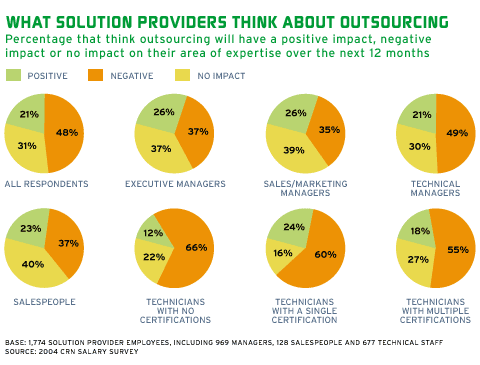Outsourcing Fear Factor
Close to half of solution providers polled in the 2004 CRN Salary Survey believe the practice of outsourcing certain projects—or pieces of certain projects—to offshore talent will put a damper on salaries.
But the effect will clearly be most profound among technical fields. The survey found that 66 percent of technicians holding no certifications believe offshore outsourcing will have a negative impact on compensation, while 55 percent of technicians holding multiple certifications felt the same.
Whether this is a good or a bad thing matters little whether you sit in a solution provider’s executive suite or among banks of engineers. Sure, as a manager, you might embrace the idea that your labor costs are lower, but it will also reduce the amount you can charge for services.
“I’m against the whole thing for the reason that it drives down the cost of my labor rates to my customers, without a shadow of a doubt,” said John DeRocker, senior vice president of sales and marketing at Nexus Information Systems, a full-service solution provider in Plymouth, Minn.
“From a business perspective, it’s going to be good, but the pricing pressures are high. The days of $80 to $100 an hour pricing are gone,” said Pete Busam, vice president and COO of Decisive Business Systems, Pennsauken, N.J. These days, those per-hour rates are more likely to average $50, depending on the task at hand, he said.
| AD | |
|---|---|
| id | unit-1659132512259 |
| type | Sponsored post |
More specifically, the offshore phenomenon has made it more difficult for Decisive to compete on help-desk projects for its midsize customers. However, the company does not plan to resort to offshore talent. “I won’t send jobs overseas,” Busam said. “Part two is I have no quality control, no metric. At the end of the day, I can’t walk down the hallway, I can't get in my car and drive down to look at the progress.”
Not surprisingly, the impact has been more profound among those who support a higher degree of software development or application customization projects, and these sorts of solution providers have embraced offshore resources as part of their business models—with reservations.
Robert Rhodes, CEO of Systems Evolution, Stafford, Texas, said he will turn to offshore partners for certain programming tasks. “Once the analyst is done, filling [the project] in is like building a house and putting up Sheetrock; you want to find the best-quality person at the lowest cost possible.” However, Rhodes will only use offshore resources for his most clearly defined projects, a sentiment echoed by others.
Douglas McReaken, vice president of sales and marketing at Software Decisions, an enterprise solution provider in Houston, said his company moved some of its application development work offshore in the third quarter of 2003. “We’re now re-evaluating if the reduced costs from offshoring is enough to offset the increased costs in project management,” he said. “I have a strong feeling we will be moving these services back in-house.”
Indeed, some solution providers said their reason for avoiding the offshore movement is more fundamental: They don’t want to break the trust of existing employees. “You are never going to be able to lower your existing employees’ payroll to that level,” said Michael Fong, CEO of Calence, a Tempe, Ariz., network integrator.
TSW Automation, a Nashville, Tenn., enterprise solution provider that keeps close tabs on its offshore outsourcing options, is more focused on controlling labor costs through attrition and employee motivation. “Your most capable people will be affected least,” said Paul Batson, company president.
And the one thing that can never be sent overseas, of course, is the face-to-face contact that local solution providers offer their customers. “That’s never going to be outsourced,” Rhodes said.


Published for the Week Of June 28, 2004